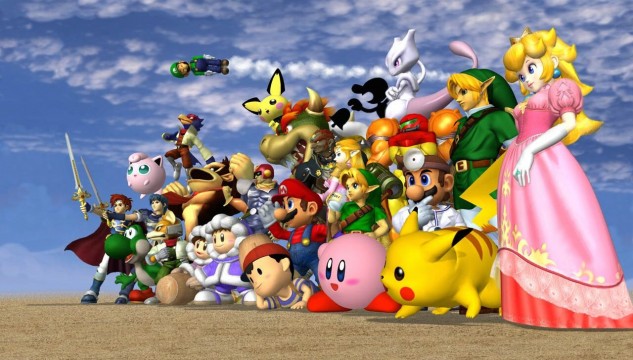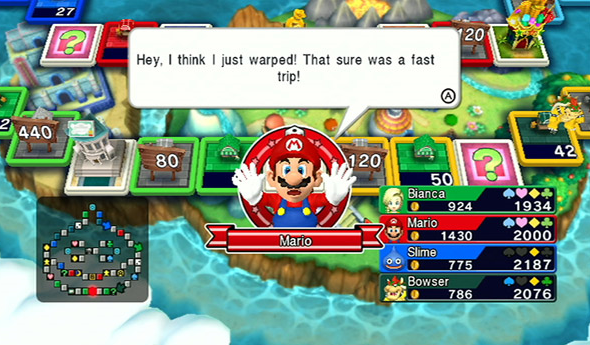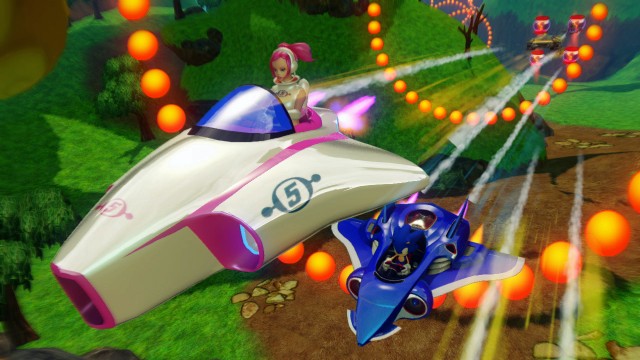
One of my absolute favorite games on Wii is Fortune Street, which is a crossover between Super Mario Bros. and Dragon Quest. I love that the creators of the game brought together two franchises that were the powerful influences in their respective genres during the ’80s, but I don’t think this was the epic crossover fans were expecting. Instead of being a platforming and JRPG hybrid, Fortune Street‘s gameplay closely resembles Monopoly and even features its own stock market system.
I really do love this game, but I can understand why fans from both series would be hesitant to sit down and play something like this. When you combine popular franchises into one game, expectations raise through the roof. When a crossover becomes over-hyped, how is it supposed to meet anyone’s expectations? In the case of Fortune Street, you might think that the crossover should have remained faithful to both series in order to create the mind-blowing experience that we’ve fantasized about in our heads. However, it’s not really that simple.

Let’s take a look at something like Professor Layton vs. Phoenix Wright: Ace Attorney, a crossover that combined two visual novel titans from Nintendo DS. Even though they bear some similarities, both series play drastically differently. While Layton games give you various kinds of brainteasing puzzles to solve, Ace Attorney games are all about cross examining witnesses in court to prove your client’s innocence. They both require critical thinking skills, but they’re applied in different ways. As a result, when Professor Layton vs. Phoenix Wright: Ace Attorney tried to keep both gameplay styles intact, many reviewers felt that the two gameplay styles didn’t mix well.
There are also crossovers that feel more like one series than the other, but those can be met with mixed reception as well. This is perfectly shown in something like Hyrule Warriors, which is a crossover between the Legend of Zelda and Dynasty Warriors. Instead of combining the puzzle solving and exploration of Zelda with the beat ’em up nature of Dynasty Warriors, Hyrule Warriors strictly plays like the latter title. Because of this, Hyrule Warriors creates a strange disconnect for fans who are only interested in Zelda games. Despite the fact that the game does a fantastic job of celebrating the Zelda series, the beat ’em up gameplay will not appeal to Zelda fans if they weren’t into it before. This is a big reason why mixed reviews appeared for this game as well.
The crossovers I prefer, like Fortune Street, ignore each series’ gameplay style and do something completely different. By creating different game mechanics with existing IPs, there will be no assumptions that the game will play a certain way. For example, Sonic & Sega All-Stars Racing does a great job of bringing a bunch of Sega properties together as a kart racer. Instead of trying to imitate certain gameplay styles, the game brings all of these characters together under a different genre while still providing some awesome fan service. I honestly can’t see a better way to combine Sonic with each of these unique Sega franchises.

Of course, Sonic & Sega All-Stars Racing is more accepted than Fortune Street because kart racing has more widespread appeal than a virtual stock market. That’s also why the upcoming Super Smash Bros. can hold so much appeal as a crossover title: people love fighting games and the action-oriented gameplay fits each character rather well. In fact, fighting game crossovers tend to be the most well received out of all the crossover titles, especially if two fighting games are being crossed over. By crossing over two styles of gameplay that are incredibly similar to each other, it’s easy for fans to have all of their expectations met.
Unfortunately, it’s very rare to have two gameplay styles that are so similar, making fighting game crossovers somewhat of an anomaly. When there is an expectation to see a specific type of gameplay from a particular series in a crossover, an audience with mixed reactions is destined to form. Don’t get me wrong, I love crossovers! I think they create interesting opportunities for the development of games that we wouldn’t normally see. However, when I see games like Hyrule Warriors being made, I know that a huge portion of fans will always feel left down in the end.
What’s your take on the matter? Have any favorite crossover titles that you’d like to share? Let us know in the comments below!




 ShareThis
ShareThis







Battletoads & Double Dragon: The Ultimate Team is still my go-to crossover game, all these years later. It’s more Battletoads than Double Dragon, but that suits me just fine. One of those last-great-hurrah NES titles.
Sonic Lost World’s Nights, Yoshi and Zelda levels are all great fun. Doesn’t quite make it a crossover game I suppose, but it’s an underappreciated gem the way some crossovers are. :^)
NES Remix is sort of the most crossover-mashup-minigame storm ever, and it’s a blast. I really hope they do a couple each of SNES Remix and Game Boy Remix at some point too.
Cool article! I am in complete agreement. Sonic and Sega All Stars Racing is boss! It’s really a great kart racer and really an unsung testament to crossovers done right. The best crossovers? Fighting games! Marvel Vs Capcom, SNK vs Capcom, Street Fighter X Tekken and of course, Smash Bros. Fighting Vipers beat lots of them to the punch. If I recall, you could use the Daytona Car!